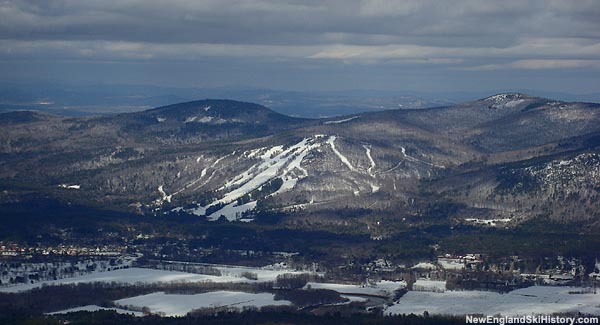
|
|
Located in popular vacation destination North Conway, Cranmore Mountain Resort is one of New England's oldest and most storied ski areas.
Early Years
One of the earliest known Cranmore ski references was during the winter of 1935-36, when the Boston Globe made note of the "Cranmore Mountain slope and trail."
In January 1937, locally-raised developer and international financier Harvey Dow Gibson reportedly acquired the slopes of 1,667 foot Cranmore Mountain and started a plan to make North Conway into a winter destination. Later in the year, the North Conway Chamber of Commerce started a fundraising campaign for ski trails and slopes. Meanwhile, a group led by Gibson acquired the Hotel Randall in North Conway in August, renaming it to the Eastern Slope Inn. The hotel was subsequently renovated for year-round use and placed under the management of National Hotel Management Company. The Eastern Slope Ski Club made the hotel its headquarters.
A 1,000 foot rope tow was installed on the lower slopes of Cranmore for the winter of 1937-38, in conjunction with a new trail. The lift debuted on January 15, 1938, serving twelve acres of terrain. Meanwhile, the Works Project Administration reportedly cleared additional slopes on the mountain. In February, a snow train from New York City carried 300 skiers to the Eastern Slope region, including Cranmore.
The Skimobile and Hannes Schneider
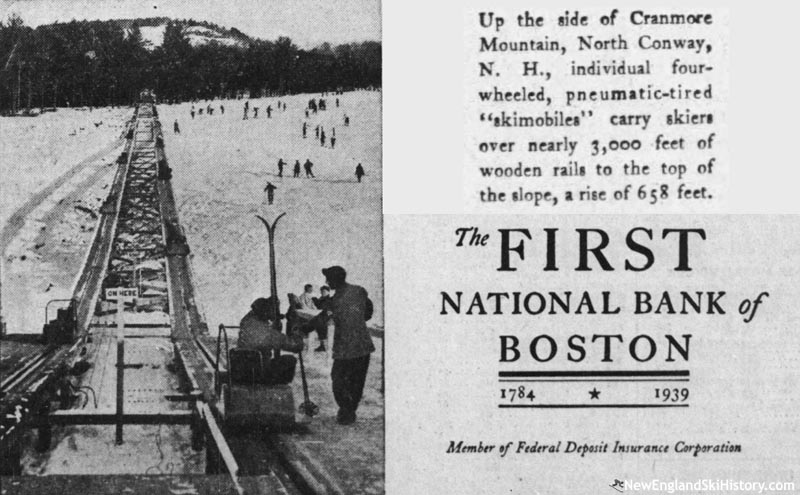
The Lower Skimobile circa 1939 |
In the era of rope tows, a cutting edge lift named the Skimobile was constructed for the 1938-39 season. Consisting of a set of cars on a track, it was only the second lift in the state that allowed the skier to be seated while riding up the mountain. Local mechanical guru George Morton was hired to design and construct the lift, which carried passengers halfway up the mountain in about 10 minutes. The New York Times described it by stating, "the device consists of a 3,000-foot board track with a vertical rise which approximates the height of a fifty-story building."
The Skimobile became very popular, sometimes giving thousands of rides per day. A rope tow helped to disperse crowds on busy days.
After negotiating with Heinrich Himmler, Gibson was able to get legendary ski instructor Hannes Schneider released from Nazi Germany and transported to the United States in January of 1939. Gibson then accompanied Schneider to a massive welcoming party in North Conway, after which Schneider essentially took the reins of Cranmore.
When poor conditions threatened an early end to the ski season, a snowstorm came to the rescue in March. The "Rattlesnake Ravine" complex officially debuted, drawing very generous comparisons in the press to Tuckerman Ravine and Gulf of Slides. The complex was described as consisting of three slopes, two of which were adjoining, and one connected by a short trail. Improvised upper mountain lift service for the complex was facilitated via 20-person sleigh pull via a cable attached to a mountaintop power plant.
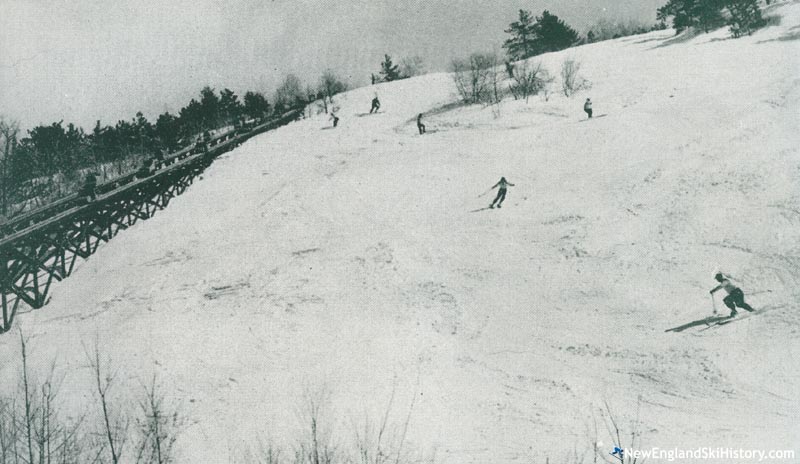
The Ledges circa the 1940s |
Upon the initial recommendation of Hannes Schneider, an upper portion of the Skimobile was added for the 1939-40 season.
The first snow train of the season arrived in late January, coinciding with the first good conditions of the winter. The Boston Globe estimated that 90% of the Boston & Maine train-goers disembarked in Conway. A few weeks later, the Skimobile carried 4,920 passengers in a single day. Over the course of the winter, the Skimobile carried 122,000 passengers, a figure that was more than double Cannon Mountain's tramway's tally.
Three new trails were added for the 1940-41 season including the Toni Matt Trail, the Middle Trail, and the Koessler Trail. A few inches of snow in late November set the stage for the earliest Boston & Maine snow train in history, bringing 168 skiers in early December to enjoy warm temperatures, albeit with bare spots due to the thin base. Subsequent conditions were hit or miss with thin cover, ice, and some closures. In late February, a "giant mat" made out of chain and "1000 long steel spikes" was dragged around the slopes to try to break up the ice crust. Snow finally arrived in mid-March, resulting in strong spring crowds.
Cranmore branched outside of skiing and sightseeing in August 1941, when it hosted the first annual Eastern Slope Regional Fair and Horse Show. Events planned included 32 equine events, as well as a motorcycle race on the ski slopes.
World War II
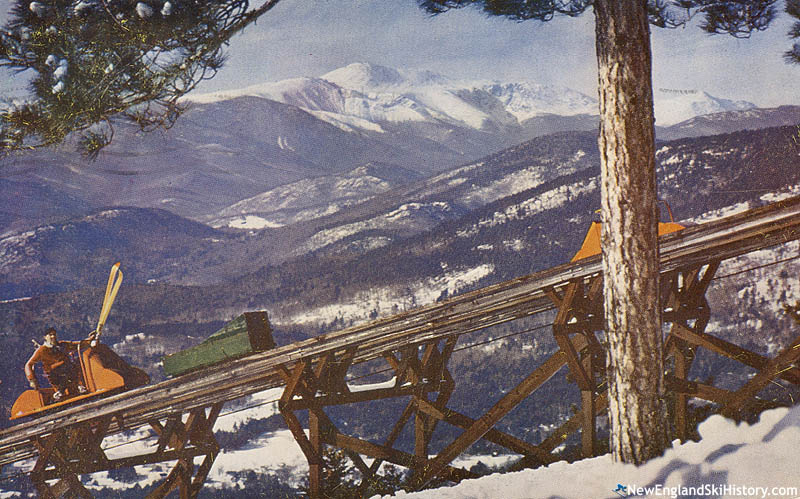
The Cranmore Skimobile circa the late 1940s or early 1950s |
The upper mountain Big Ben Trail was extended to the base of the mountain for the 1941-42 season, while Kandahar and Little Kandahar were widened and graded. In terms of lifts, a 1,000 foot rope tow was installed on the South Slope, while the Skimobile cars were painted red, white, and blue. In addition, a new skating pond was advertised. The season likely started a week after the attack on Pearl Harbor.
The "first good snow" of the 1941-42 season was reported in early January, as snow trains carried hundreds to Conway. Not only did skiers enjoy the slopes, but the skating rink "lighted with red, green and gold lights" was also a notable attraction, according to the Boston Globe.
In mid-January 1942, the Boston Globe published a story about a "scientific process called 'snow-farming'" that it attributed to Cranmore manager Phil Robertson. A cornerstone to his program was off-season maintenance, noting, "Twelve inches of frozen ground is worth many inches of snow." Robertson's practice was to remove leaves and keep water off the trails to allow for a deep frost, and to roll slopes after each snowfall to prevent loss from winds. Ironically, days after the story was published, Cranmore was left with only a couple inches of base, resulting in the postponement of a prominent race.
February 1942 kicked off decently, as Cranmore reportedly picked up its first snow since early January. A fashion show was held on the summit, featuring more than a dozen models. One week later, new speakers pumped out music on the slopes. The season likely ran through late March.
Whereas many ski areas shut down in 1942 due to World War II and gas rationing, Cranmore was able to remain in operation because the Skimobile was powered by electricity. The 1942-43 season may have kicked off in mid-December with poor conditions on a four to eight inch base. A timely snow storm provided strong business to start the Christmas holiday week, despite the wartime travel difficulties.
By the time the season approached its conclusion in March, the Eastern Slope Inn had recorded its best winter season. The increase in visitation was attributed to servicemen and those about to enter the service staying there while skiing at Cranmore.
The 1943-44 season also likely started in mid-December, with the Eastern Slope Ski School managing to stay in operation despite many instructors having left for military service (including Hannes Schneider's son Herbert). The ski season likely lasted into April.
On November 24, 1944, a fire reportedly starting in the control room of the Skimobile burned for multiple hours. Despite causing an estimated $10,000 in damage, enough spare parts were reportedly available to fix it in time for ski season. The 1944-45 season likely kicked off after a moderate snow storm in mid-December, with the repaired Skimobile operating before Christmas. The season likely continued through the end of calendar winter before melting out.
Post-War Growth
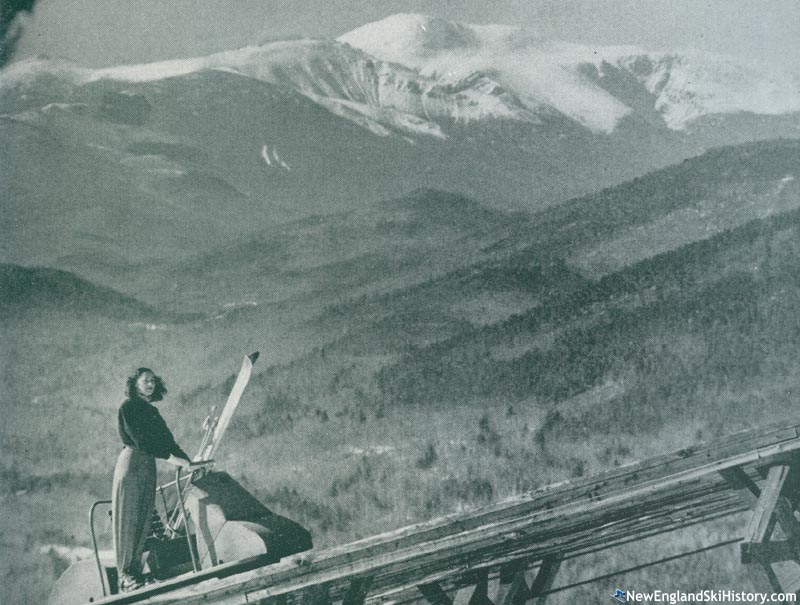
The Upper Skimobile |
Following the end of World War II, investment in Cranmore accelerated. The cornerstone of 1945 improvements was a new base station, which included a base platform constructed in cement that was doubled in size. A second floor restaurant was constructed, while the ski shop was expanded. The lower Skimobile track was also replaced. In addition to the lift and lodge improvements, the Franz Koessler trail was cut in honor of the ski instructor who had been killed in a military training accident at Camp Croft in South Carolina in 1944.
The 1945-46 season kicked off just before Christmas while base station construction continued. Strong holiday week crowds were reported.
The Alberg trail opened in late December of 1946. By this point, Harvey Gibson had invested $1,000,000 in the snow train destination resort.
Building on the popularity of the Arlberg Trail, in 1948 Schneider cut a new trail in the vicinity of the defunct Rolling Rock trail and named it the North Conway trail. A second rope tow was added to the South Slope that off season as well.
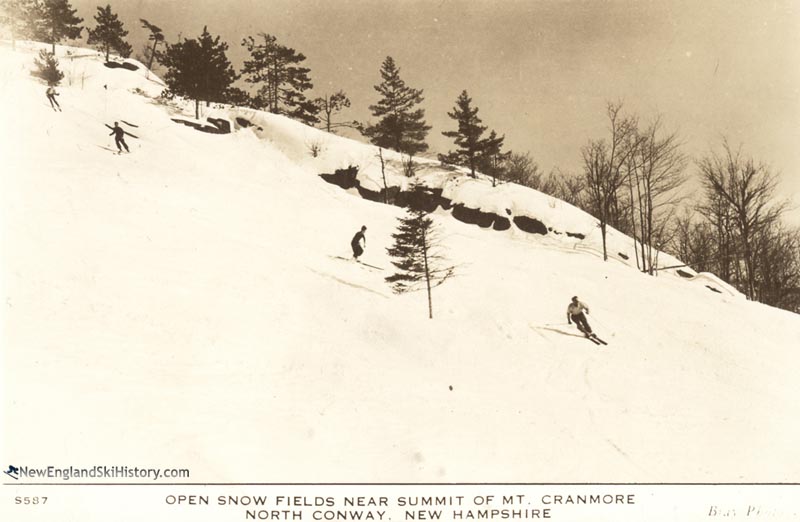
The upper mountain |
While the 1949-50 season got off to a promising start with the earliest opening ever on December 11, the new decade was overshadowed by deaths, the first of which being Harvey Gibson in September.
The Artist Falls Trail debuted for the 1952-53 season. A larger expansion was being planned.
The winter of 1954-55 provided a boon for Cranmore, as each month saw significant increases over the prior year. As a result, the expansion to the back side of the mountain was ready to come to fruition. Unfortunately, while laying out the expansion in April of 1955, Hannes Schneider suffered a fatal heart attack. Though his death was a major blow to Cranmore, the East Bowl expansion project continued that off season with Herbert Schneider taking over for his father. Opening in December of 1955, the double chairlift served complex was complemented with a new Poma lift on the South Slope. The development also brought forth rumors of further expansion to Black Cap, however only one trail/access road was partially cut.
A new version of the Rattlesnake Trail was cut for the 1957-58 season. A new 4,000 foot Poma lift was advertised for the following season, however it was never fully installed.
Circa the early to mid 1960s, longtime Cranmore general manager Phil Robertson retired, later developing nearby Mt. Attitash. Herbert Schneider was named Cranmore's manager for the 1962-63 season, which turned out to be a record. Following the season, Cranmore installed its second double chairlift for its quarter century anniversary. Around this time, night skiing was discontinued, with Schneider remarking "we were paying more to pick up empty beer and soda bottles than we were taking in."
Unfortunately, a decline in business was starting. Not only were larger mountains being developed, but Interstates 89 and 93 were soon providing easier travel to these new places. In January of 1968, the Portsmouth Herald issued a scathing review, stating "Cranmore has had nothing new to offer the skier in recent years. Our displeasure with Cranmore is increased when we compare it with the Granite State's two oldest areas, Cannon and Gunstock!"
The Snowmaking Era Begins
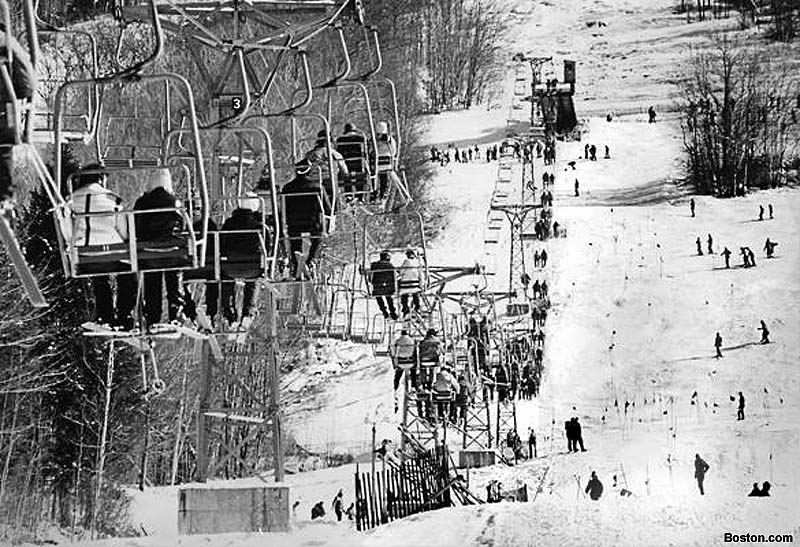
The Mid Double circa 1974 |
A third double chairlift was likely installed for the 1969-70 season (it may not have opened until 1971), serving the lower mountain. A snow drought that winter threatened the area's economy, resulting in local business owners joining together to rent snowmaking equipment for the South Slope. A $250,000, 44 acre snowmaking system was installed for the 1970-71 season, helping to prevent anymore lack-of-snow closures.
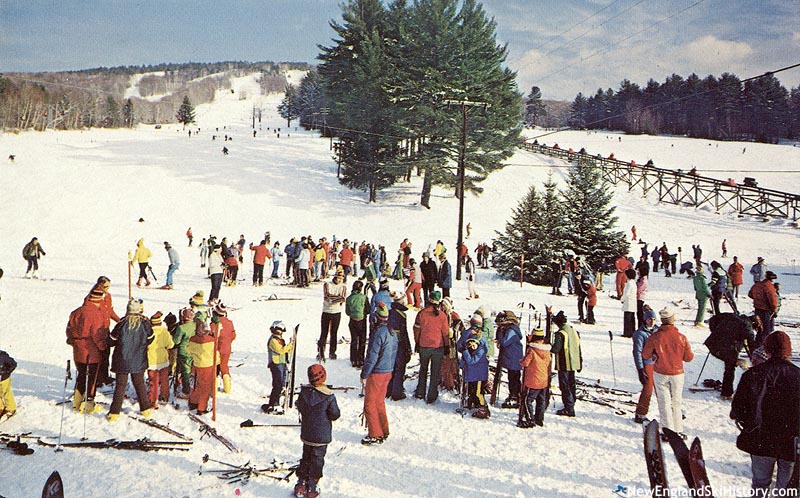
The base area circa the 1970s |
Following a fire, the East Bowl double was mostly replaced with Mueller parts for the 1973-74 season. Meanwhile, the recently installed snowmaking system came in handy, as Cranmore was the only Mt. Washington Valley ski area to open in December of 1973.
The Mount Cranmore Tennis and Recreation Club was constructed for 1975, when the Volvo International Tennis Tournaments were relocated from the Mount Washington Hotel to Cranmore's 8,200 seat stadium. The clay courts hosted a decade long run of the tournament, which had famous victors such as Jimmy Connors and Ivan Lendl.
Schneider Sells Cranmore
Lacking the capital to keep Cranmore competitive, Herbert Schneider sold the ski area to Ed Mank's Mt. Cranmore, Inc. in the fall of 1984. Rick Lavoie took over as General Manager. While snowmaking was extended to the summit in 1985, that year also marked the departure of the Volvo International Tennis Tournaments to Stratton.
Food service supervisor Marilyn Miller was promoted to General Manager for the 1986-87 season. A $3 million expansion program was completed for that season, including a significant snowmaking expansion, six new trails, a new base lodge, and the installation of a triple chairlift to the summit. Another $1.1 million was invested for 1987-88, including a new chairlift South Slope, increasing snowmaking, and base area improvements, coinciding with a slopeside condominium development.
An off season business was attempted in the summer of 1989, when a golf driving range was opened on the Beginner's Luck slope. Top to bottom night skiing was also added that year, as 120 poles were set with high pressure sodium light fixtures. Five trails off the summit were lit, as well as the South Slope.
This was not enough, however, to keep Cranmore from sinking. While Cranmore enjoyed successful decades at the beginning of its history, it was eventually overshadowed by its larger nearby competitors, such as Attitash, Bretton Woods, and Wildcat.
After operating the Skimobile on a limited schedule and celebrating its 50th anniversary in 1988-89, Cranmore discontinued the lift at the start of the 1989-90 season, citing excessive operating and maintenance costs. A spokesperson noted that "every time it snows, we need to use eight employees to keep it running all night."
While there was talk of retaining the Skimobile as a summer attraction, Cranmore began removing the lift in the spring of 1990.
Debt was adding up. Bay Bank assumed ownership in November of 1991, keeping Mt. Cranmore, Inc. onboard in a management capacity. As a last ditch effort, in 1994 Ed Mank attempted to create a corporation named Alpenuity, which would be owned by 1,000 shareholders. The goal of the new entity was to absorb the $4.5 million in debt and to install a new high speed quad. The plan did not come to fruition, as in August of 1994, Bay Bank brought in Sno-Engineering to operate the ski area for a season as it looked for a buyer. Ken Lydecker served as interim General Manager. By 1995, three prospective buyers emerged.
LBO and Booth Creek
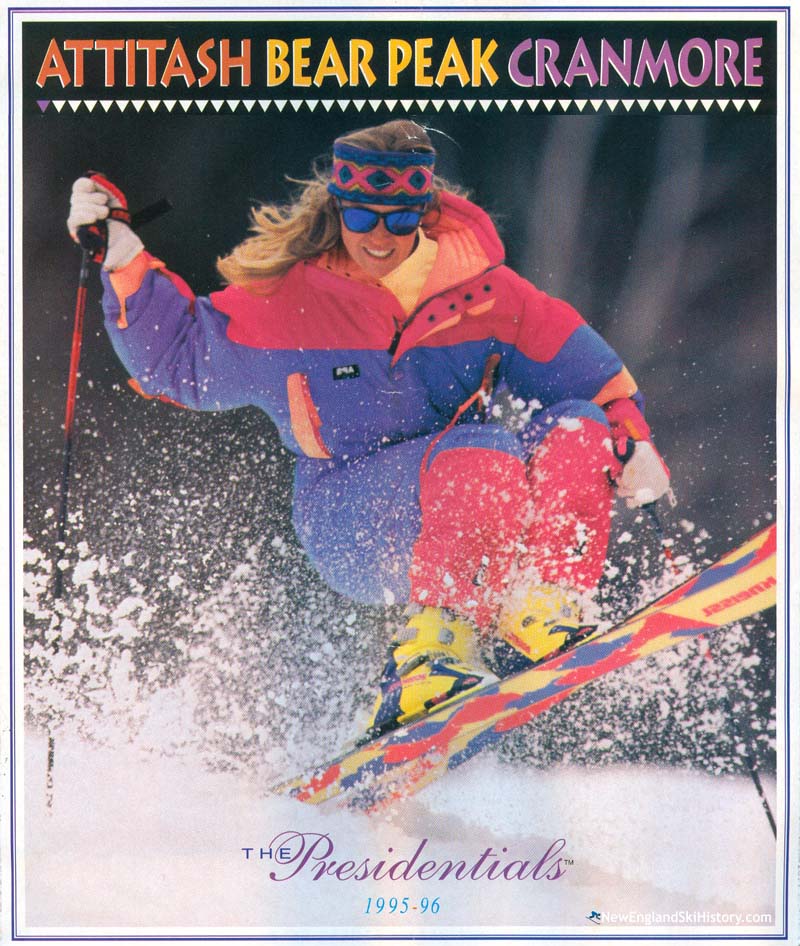
Attitash Bear Peak Cranmore jointly advertised by LBO Resorts in 1995 |
In June of 1995, Les Otten's LBO Resort Enterprises Corp. purchased Cranmore and subsequently installed a Doppelmayr high speed detachable quad, climbing 1,123 vertical feet to the summit. Tim Harris was named General Manager. The area was co-marketed with Otten's other recent acquisition, Attitash Bear Peak.
A merger with S-K-I Ltd. in 1996 resulted in the formation of American Skiing Company and a Justice Department order to sell Cranmore due to antitrust concerns. As such, American Skiing Company sold Cranmore and Waterville Valley to Booth Creek Ski Holdings, Inc. in November of 1996.
Branching out from just being a ski area, Cranmore added lift served mountain biking in 1996 and snow tubing in 1997, to go along with its lighted snowboard halfpipe and terrain park. Following Tim Harris's departure to the Canyons, Ted Austin took over as General Manager in 1997. Also in 1997, Booth Creek CEO George Gillett announced plans to expand Cranmore to the top of Black Cap in one to two years. The proposal would not come to fruition.
Night skiing was briefly discontinued for the 2001-02 season.
Bretton Woods Marketing Director Ben Wilcox was named Cranmore General Manager in June 2004.
FO Resorts Purchases Cranmore
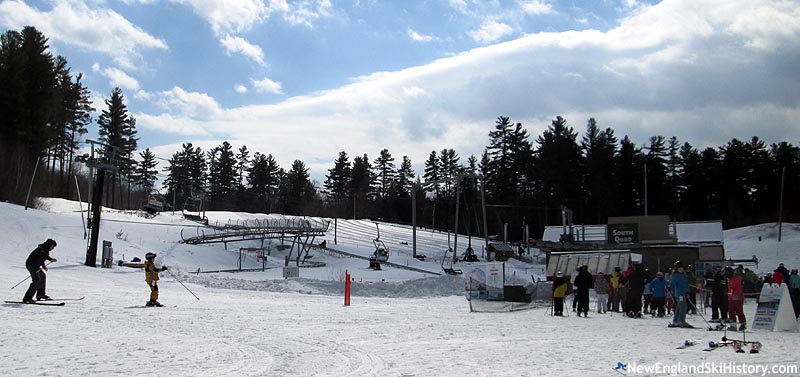
The South Quad and non-skiing amenities (2016) |
Booth Creek would own and operate Cranmore through the 2009-2010 season. On June 15, 2010, Booth Creek sold Cranmore to Brian Fairbank, Tyler Fairbank, and Joseph O'Donnell, the operators of Jiminy Peak in Massachusetts. An aggressive expansion project was immediately started, including the installation of a mountain coaster and a fixed grip quad chairlift. The outdoor clay tennis courts were also removed that year.
The historic East Bowl double chairlift was removed in 2012 and replaced with a Doppelmayr triple chairlift. Additional terrain was opened in the East Bowl to complement the new lift.
In September 2016, ground was broken on new real estate development in the base area, which is expected to eventually result in new base facilities for skiers. As a result, the base terminal of the South Quad was relocated to make way for the first phase of Kearsarge Brook condos. Construction on the second phase commenced in 2019.
Following the 2021-22 season, the base lodge was demolished to make way for a new structure. Makeshift base facilities were used during the 2022-23 season while the Fairbank Lodge was constructed in its place. Meanwhile, the Skimobile Express Quad was rebuilt during the 2022 off-season.
NewEnglandSkiConditions.com Reports
| Month |
Average Percent of Terrain Open |
| November | 15% (3 reports) |  | | December | 31% (5 reports) |  | | January | 82% (3 reports) |  | | February | 91% (4 reports) |  | | March | 77% (8 reports) |  |
|
| Recent Conditions Reports |
 | Mar. 8, 2025 by skiit
Loose Granular, Frozen Granular |
 | Mar. 8, 2025 by liftnerd
Loose Granular, Ice |
 | Feb. 9, 2025 by rocket21
Powder, Packed Powder |
 | Mar. 10, 2024 by skiit
Wet Packed Powder, Variable Conditions |
 | Mar. 9, 2024 by meirk
Spring Snow, Variable Conditions |
|
|
| Cranmore Mountain Resort on NewEnglandSkiConditions.com |
NewEnglandSkiIndustry.com News
Expansion History
Image Gallery
Lifts
Click on lift name for information and photos
Maps
Year by Year History
Adult Weekend Full Day Lift Ticket; Adult Full Price Unlimited Season Pass. Window price, including RFID fee and taxes when known.
| 2020s |
Ticket Price |
Season Pass Price |
Pass Payback |
Opening Day |
Closing Day |
Skier Visits |
| 2025-26 | $134.00 |  | $1229.00 |  | 9.2 days | December 5 | | |  | | | 2024-25 | $124.00 |  | $1195.00 |  | 9.6 days | December 6 | April 6 | |  | | | 2023-24 | $119.00 |  | $1139.00 |  | 9.6 days | November 24 | April 7 | |  | | | 2022-23 | $109.00 |  | |  | | November 25 | April 2 | |  | | | 2021-22 | $99.00 |  | $959.00 |  | 9.7 days | December 3 | March 27 | |  | | | 2020-21 | $99.00 |  | |  | | December 4 | March 27 | |  | | | 2019-20 | $89.00 |  | $879.00 |  | 9.9 days | November 16 | March 15 | |  | |
| 2010s |
Ticket Price |
Season Pass Price |
Pass Payback |
Opening Day |
Closing Day |
Skier Visits |
| 2018-19 | $83.00 |  | $855.00 |  | 10.3 days | November 17 | April 7 | |  | | | 2017-18 | $75.00 |  | $749.00 |  | 10.0 days | November 24 | April 1 | |  | | | 2016-17 | $72.00 |  | $729.00 |  | 10.1 days | December 3 | April 2 | |  | | | 2015-16 | $70.00 |  | $699.00 |  | 10.0 days | November 27 | March 20 | |  | | | 2014-15 | $64.00 |  | $679.00 |  | 10.6 days | November 22 | April 5 | |  | | | 2013-14 | $63.00 |  | $639.00 |  | 10.1 days | November 23 | April 6 | |  | | | 2012-13 | $59.00 |  | $639.00 |  | 10.8 days | November 23 | March 31 | |  | | | 2011-12 | $64.00 |  | $619.00 |  | 9.7 days | November 26 | March 21 | 117,351 |  | | | 2010-11 | $59.00 |  | $569.00 |  | 9.6 days | November 27 | March 27 | 118,000 |  | | | 2009-10 | $55.00 |  | $529.00 |  | 9.6 days | December 12 | March 21 | |  | |
| 2000s |
Ticket Price |
Season Pass Price |
Pass Payback |
Opening Day |
Closing Day |
Skier Visits |
| 2008-09 | $55.00 |  | $529.00 |  | 9.6 days | December 6 | March 29 | |  | | | 2007-08 | $49.00 |  | $499.00 |  | 10.2 days | December 8 | April 6 | |  | | | 2006-07 | $47.00 |  | $429.00 |  | 9.1 days | December 9 | March 25 | |  | | | 2005-06 | $45.00 |  | $399.00 |  | 8.9 days | December 10 | March 26 | 108,000 |  | | | 2004-05 | $39.00 |  | $349.00 |  | 8.9 days | December 11 | March 27 | 128,000 |  | | | 2003-04 | $35.00 |  | $349.00 |  | 10.0 days | December 13 | March 28 | 102,000 |  | | | 2002-03 | $35.00 |  | $459.00 |  | 13.1 days | November 29 | March 30 | 119,000 |  | | | 2001-02 | $32.00 |  | $489.00 |  | 15.3 days | December 15 | March 24 | 96,000 |  | | | 2000-01 | $29.00 |  | $459.00 |  | 15.8 days | November 25 | April 1 | 129,000 |  | | | 1999-00 | $29.00 |  | |  | | December 4 | March 26 | 100,000 |  | |
| 1990s |
Ticket Price |
Season Pass Price |
Pass Payback |
Opening Day |
Closing Day |
Skier Visits |
| 1998-99 | $29.00 |  | |  | | December 16 | | 112,000 |  | | | 1997-98 | $39.00 |  | |  | | November 28 | | 100,000 |  | | | 1996-97 | |  | |  | | | March 30 | |  | | | 1995-96 | |  | |  | | | April 7 | |  | | | 1994-95 | $35.00 |  | |  | | December 10 | | |  | | | 1993-94 | |  | |  | | December 18 | April 3 | |  | | | 1992-93 | $33.00 |  | |  | | | | |  | | | 1991-92 | $33.00 |  | $775.00 |  | 23.5 days | | March 29 | |  | | | 1990-91 | $29.95 |  | |  | | December 8 | March 30 | 110,000 |  | | | 1989-90 | $29.00 |  | $650.00 |  | 22.4 days | December 2 | | |  | |
| 1980s |
Ticket Price |
Season Pass Price |
Pass Payback |
Opening Day |
Closing Day |
Skier Visits |
| 1988-89 | $28.00 |  | |  | | December 10 | | |  | | | 1987-88 | $26.00 |  | |  | | December 19 | | |  | | | 1986-87 | $22.00 |  | |  | | December 6 | | |  | | | 1985-86 | $19.00 |  | |  | | | | |  | | | 1984-85 | $18.00 |  | $400.00 |  | 22.2 days | | | |  | | | 1983-84 | |  | $400.00 |  | | | | |  | | | 1982-83 | $17.00 |  | $400.00 |  | 23.5 days | | | |  | | | 1981-82 | $17.00 |  | |  | | | | |  | | | 1980-81 | $14.00 |  | $330.00 |  | 23.6 days | | | |  | | | 1979-80 | $13.00 |  | |  | | | | |  | |
| 1970s |
Ticket Price |
Season Pass Price |
Pass Payback |
Opening Day |
Closing Day |
Skier Visits |
| 1978-79 | $12.00 |  | |  | | | | |  | | | 1977-78 | $10.00 |  | |  | | December 17 | | |  | | | 1976-77 | $10.00 |  | $200.00 |  | 20.0 days | | | |  | | | 1975-76 | $10.00 |  | |  | | | | |  | | | 1974-75 | $9.00 |  | |  | | December 22 | | |  | | | 1973-74 | $9.00 |  | |  | | | | |  | | | 1972-73 | $8.00 |  | $150.00 |  | 18.8 days | | | |  | | | 1971-72 | $8.00 |  | |  | | | | |  | | | 1970-71 | $8.00 |  | |  | | | April 11 | |  | | | 1969-70 | $8.00 |  | |  | | | | |  | |
| 1960s |
Ticket Price |
Season Pass Price |
Pass Payback |
Opening Day |
Closing Day |
Skier Visits |
| 1965-66 | |  | |  | | | March 25 | |  | | | 1964-65 | $6.00 |  | |  | | | | |  | | | 1963-64 | $5.50 |  | |  | | December 7 | | |  | | | 1962-63 | $5.50 |  | |  | | | | |  | | | 1961-62 | |  | |  | | November 24 | April 8 | |  | | | 1959-60 | $5.50 |  | |  | | | | |  | |
| 1950s |
Ticket Price |
Season Pass Price |
Pass Payback |
Opening Day |
Closing Day |
Skier Visits |
| 1958-59 | $5.00 |  | |  | | | April 5 | |  | | | 1957-58 | |  | |  | | | April 13 | |  | | | 1955-56 | |  | |  | | December 10 | | |  | | | 1953-54 | |  | |  | | December 16 | | |  | | | 1952-53 | |  | |  | | December 13 | | |  | | | 1949-50 | |  | |  | | December 10 | | |  | |
| 1940s |
Ticket Price |
Season Pass Price |
Pass Payback |
Opening Day |
Closing Day |
Skier Visits |
| 1947-48 | |  | |  | | December 13 | | |  | | | 1945-46 | |  | |  | | December 22 | | |  | |
| 1930s |
Ticket Price |
Season Pass Price |
Pass Payback |
Opening Day |
Closing Day |
Skier Visits |
| 1937-38 | |  | |  | | January 15 | | |  | |
Visitor Memories
| "I always came up here with my family on the final days of February Vacation. At first, we were not allowed to do any blacks under any circumstances, but on our second trip, my Uncle tried to take me and my brother down the Ledges. I panicked above the steep section and told my brother it was suicidal, before taking off my skis and hiking through the woods for an hour trying to find a blue square. By the time my family found me, my mom and dad were angry at me, and I was grounded for a day. However, I was still able to do some other blacks for a while. North Conway became my favorite trail fast. " | | Iama Skeer, Feb. 23, 2026 | | "My daughter Amanda Brown and I participated in the 50th anniversary celebration as part of the cast and chorus for its gala review. Today my grandchildren ski Cranmore, almost 40 years later!" | | Mary Ellen Mackin, Feb. 22, 2024 | | "The Winter of 1975 we planned a family ski week, with the Grandparents in tow, and stayed at the Christmas Farm Inn in Jackson. There are sweet memories of teaching our 4 1/2 yo son Rick to ski at Mt Cranmore & riding that great Skimobile to the top Buckling both our skis back on, skiing our way down the slope then back on that Skimobile- Skis off then back on - labor intensive -for another training run - a great day & lots of good memories- today he lives & works in No Conway Definitely enjoying Mt Cranmore & the Mt Washington Valley Skiing.
" | | Ted& Sandy Adami, Jan. 16, 2024 | | "Many years back, i helped a man dismantle much of the Poma lift and bring it to Windham, NH.
Vic Landry was his name and he had plans to ecpand his little rope tow ski area in Windham. It was called "Landry's Ski Slopes" I learned to ski there and earned a spot working there at a very young age. I'm willing to bet that the Poma Lift might still be stored on the property. I should find out. It never got installed as far as I know. " | | Mr. C Farwell, Dec. 17, 2023 | | "I grew up in Acton,Maine and have fond memories sking the upper icy slopes in 1948-1949.
Unfortunately the ski patrol was very active transporting skiers with broken bone to No Conway hospital for broken bones.
I have lived in South Carolina for 60 years but still remember the Skimobile and those wonderful times.
" | | Richard A. Beals, Oct. 23, 2023 | | "I learned how to ski here back in 2010! Haven't skied Cranmore since but heard lots of good things about it. I'll have to go ski there again someday" | | Liam McNeil, Nov. 18, 2019 |
|
External Links
Cranmore Mountain Resort - official site
Cranmore Mountain - FranklinSites.com Hiking Guide
|
Last updated: February 13, 2024
|



